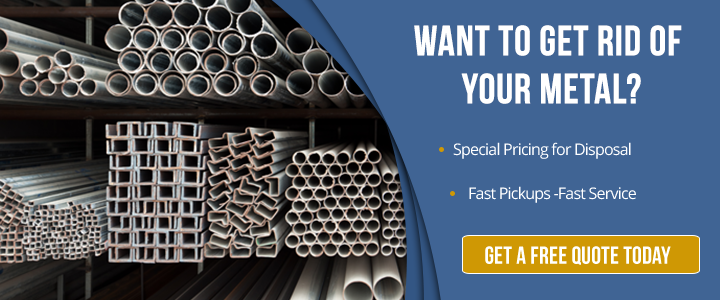If your manufacturing process involves the use of metal, you may be surprised to know that recycling offers many benefits.
Although we usually think of recycling as paper, plastics, bottles and cans, metal can be recycled as well. In fact, a single piece of metal can be recycled over and over without altering its properties. Recycling isn’t reserved for only households as well. Many businesses in various types of industries take advantage of recycling opportunities to improve their sustainability.
In addition to increasing your company’s level of sustainability, recycling metal provides other perks as well, from creating jobs to offering a convenient way to safely dispose of unwanted materials. In fact, the recycling process is often easy since a hazardous waste disposal company will transport the metal materials to a recycling facility.
If metals are not yet included in your recycling initiatives, here are four reasons you should be using metal recycling services at your facility:
-
Recycling metal helps the environment.
-
Recycling metal provides economic benefits.
-
Recycling metal is convenient.
-
Almost any metal is recyclable.
Recycling Metal Helps The Environment
 Recycling any type of material has environmental benefits. Recycling reduces pollution, preserves resources and keeps waste out of landfills. But, recycling metal has additional environmental benefits.
Recycling any type of material has environmental benefits. Recycling reduces pollution, preserves resources and keeps waste out of landfills. But, recycling metal has additional environmental benefits.
Recycling metal helps reduce the amount of ore that is mined each year. In 2021, the United States produced approximately 46 million metric tons of iron ore. Yet the U.S. is far below other countries like China, Australia and Brazil, which are among the world’s largest producers of iron ore. Australia alone produced 900 million metric tons in 2021.
The process of metal extraction and processing comes with many drawbacks, however. Concerns include:
- Physical disturbances to an area where mining occurs
- Soil and water contamination
- Air contamination
- Public safety issues from abandoned mines
- Habitat destruction from mining new ore
Reducing the amount of ore that is mined by instead recycling metal can help mitigate some of these environmental concerns and conserve natural resources. In fact, the National Institutes of Health reports that using scrap steel instead of virgin ore to make new steel uses 40% less water and creates 97 percent less mining waste.
Metal recycling reduces greenhouse gas emissions as well. According to the Institute of Scrap Recycling Industries, recycling metal may reduce emissions by as much as 300 million tons.
Recycling Metal Provides Economic Benefits
Aluminum and steel are among the most common metals that are recycled, although other types include silver, copper, brass and gold.
As is the case with any material that is recycled, if you use less of it (and instead reuse it), prices of that material come down. That means more money in your pocket over time.
This is important because many industries use precious metals. Materials like platinum and palladium are used as catalysts in various sectors, including automotive and chemical. And, because these metals are so useful, their expense can be great.
Reusing metals by giving them a second life not only saves money, but grows other areas of the economy as well. Studies show recycling even creates jobs. In fact, the National Institutes of Health says if you take 10,000 tons of waste:
- Incinerating it creates 1 job.
- Putting the waste in a landfill creates 6 jobs.
- Recycling that same waste creates 36 jobs.
Recycling Metal Is Convenient
 Recycling metal does not have to be a difficult process to incorporate into your facility’s recycling operations. In fact, it can be easy and convenient.
Recycling metal does not have to be a difficult process to incorporate into your facility’s recycling operations. In fact, it can be easy and convenient.
While many manufacturers generate hazardous waste as part of their operations, the good news is that in California, scrap metal is not subject to hazardous waste management laws IF it meets the regulatory definition and is recycled.
Although scrap metal is usually not considered hazardous, it can still release hazardous constituents into the air, soil or water. For example, finely divided metal grindings may have toxic properties if they contain heavy metals like:
- Barium
- Cadmium
- Chromium
- Copper
- Lead
- Nickel
- Zinc
To avoid any waste violations and potential situations where your company could be at fault for polluting soil and waterways, it’s imperative to work with a reputable hazardous waste disposal company to ensure the metal you need disposed of is properly recycled.
Some hazardous and non hazardous industrial waste disposal companies will offer commercial pickup services for companies. Containers left at a job site or at a facility easily collect the recyclables and range in size. The disposal company then returns to collect the items.
Some recycling companies offer drop-off services as well. This is convenient for small businesses who produce some metal for recycling, but do not produce the high quantities that other commercial operations might produce.
When choosing a hazardous waste disposal company, make sure it is licensed and registered. using the California Department of Toxic Substances Control’s Registered Hazardous Waste Transporter Database. You can search by either “active transporters by city” or “active transporters by county.” You can also search by zip code if you’re looking for a company in a particular area.
The database provides information about when the transporter’s registration expires, its registration number and its location. A hazardous waste transporter registration is valid for only one year, so it’s a good idea to conduct annual environmental audits of vendors handling your metal waste. As can happen with any business, a reliable environmental vendor can lose its approved registration status if it does not meet certain requirements.
An additional benefit of working with a hazardous waste disposal company is that if you generate other types of potentially hazardous substances such as rechargeable batteries, flammable liquids, fluorescent light bulbs, oil, electronic waste, solvents or chemicals, a disposal company can simply add metal waste as an additional waste stream. Disposal companies will then transport each type of waste to either the appropriate hazardous waste facility or to a recycling collection site.
Our article, How To Choose A Hazardous Waste Disposal Transporter, offers advice on what to look for when selecting a disposal company to transport your metal waste to a recycling facility.
Almost Any Metal Is Recyclable
Nearly every type of metal can be recycled over and over again. Metals are classified in one of two ways ... ferrous or non-ferrous. Examples of ferrous metals are carbon steel, wrought iron and cast iron. These types of metals have a combination of iron and carbon.
Common non-ferrous metals include aluminum, zinc, tin, copper and lead. All precious metals are non-ferrous as well, such as gold, palladium, platinum and silver.
Once scrap metal is picked up by a waste transporter or dropped off at a recycling facility, the metals are separated by type. They are then shredded to help reduce the amount of energy expended during the melting process.
After metal is melted in a furnace, purification (often using electrolysis) ensures the final product does not contain any contaminants. In manufacturing, electrolysis is a type of technique that applies a direct electrical current to cause a chemical reaction.
After metal cools and solidifies, it is used as a raw material to produce new products.
Final Note
Many industries use metals as part of their operations. Recycling these metals can provide substantial environmental and economic benefits over time.
However, it’s important to ensure you work with a reputable hazardous waste disposal company to ensure any metal waste you generate is transported to the appropriate recycling facility since many metals still contain hazardous materials.
Recycling metal waste is a responsible choice for any company looking to optimize its operations while making a positive impact on the environment.


Comment